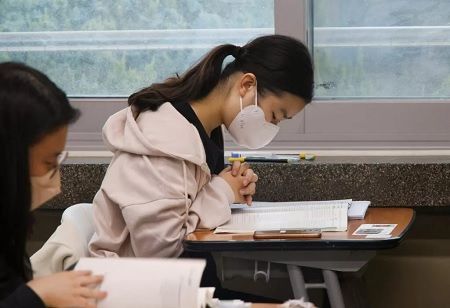-
- IB-driven discussion-based learning takes root in Daegu, with student-led economic debates showcased in a macroeconomics class at Daegu Gyeongbuk High School.
- Daegu marks 10 years of its 'Education Capital' vision, expanding IB from 20 schools in 2018 to 105 schools in 2025 with high satisfaction rates among students and parents.
- Holistic education initiatives strengthened, including emotional well-being programs and award-winning Neulbom after-school care, alongside AI-focused tech learning for future-ready students.
A macroeconomics class conducted on the 23rd of last month at Daegu Gyeongbuk High School showed how discussion-based learning has taken root in the city, by way of the International Baccalaureate program. In the class, called 'IB Economics SL 2', eight second-year students explored Vietnam's economic growth through independent research into articles and academic papers, with reference to the economics textbook Mankiw's Economics. The students debated, drawing on their independent research, exchanging views on Vietnam's prospects.
Those supporting its growth underlined low labor costs and great potential for technological development, arguing that the annual growth rate would be about 4%. Others counteracted that fast growth could widen the gap between rich and poor or drive speculation in real estate and inflation, pointing out that it shares the same context as cases in history where the economy of an emerging country took off.
At one point, students asked for proof from their peers, adding weight to the academic discussion. The instructor participated mainly by answering questions and summarizing corrections, while the bulk of the session was led by students' research and dialogue-the essence of the IB model that was introduced into Daegu's public education system in 2018.
The Daegu Metropolitan Office of Education celebrated the 10th anniversary of its declaration to make Daegu the 'Education Capital' of South Korea since October 2015. At a celebratory ceremony held at the Daegu Student Culture Center last month, the expansion of the IB program was one of the most transformative milestones. Since its first introduction into 20 schools in 2018, IB has grown to 105 schools this year, which is an increase of over five times in just seven years.
Other regions have taken the cue from Daegu and either adopted or started promoting the program, including Seoul, Gyeonggi, Gyeongbuk, and Jeollanam. Daegu also takes the top spot in the country for the number of IB World Schools accredited directly by the International Baccalaureate Organization with 32 schools, while the number of students who finished IB programs this year reached 14,007.
Also Read: 10 Top Scholarships Helping Asian Students Achieve Academic Excellence
Surveys show high satisfaction with the approach from students and parents alike. In a 2023 survey across Daegu's IB World Schools, student satisfaction reached 94.7% in elementary schools, 82.3% in middle schools and 93.6% in high schools, while parent satisfaction levels were similarly high. One student who completed the IB curriculum and went on to Yonsei University remarked that the program taught the joy of learning through inquiry rather than memorization, and that the student-centered style helped in adapting to essay and presentation-based coursework at university.
Besides IB, the education office in Daegu has been promoting students' psychological stability and emotional development. In 2022, it introduced Mind Semester System for fifth-grade elementary and first-year middle school students, using self-developed material to help them understand their emotions and mental state. Mind Semester System expanded into all elementary and middle schools this year after its initial pilot period in 12 schools. A separate Mindfulness Program promotes emotional well-being, and activities such as thankfulness practice, short meditation each day, and emotional regulation techniques were incorporated into school mornings and breaks. About 160 000 students took part this year.
The city has also been highly successful in its care of students. Its Neulbom School initiative, a before- and after-class program for elementary school students, was awarded the grand prize in the Ministry of Education's 2025 Neulbom·After-School Excellence Case Competition. Over 20,000 students can now access Neulbom classrooms without waiting lists, thanks to partnerships with 28 institutions and thousands of instructors running more than 3,000 programs.
Daegu is emphasizing education in advanced technologies like artificial intelligence to better prepare the students for the future. The plans include problem-solving activities for elementary students using state-of-the-art tools, immersive SW-AI experiences for middle school students, AI startup camps analyzing public data, and IT collaboration clubs and hackathons jointly held with Gwangju. "Daegu will keep innovating, evolving into the 'Global Education Capital' that attracts attention from all over the world", said Superintendent of Education Kang Eun-hui in celebration of the 10th anniversary of the declaration as the 'Education Capital'.
🍪 Do you like Cookies?
We use cookies to ensure you get the best experience on our website. Read more...

